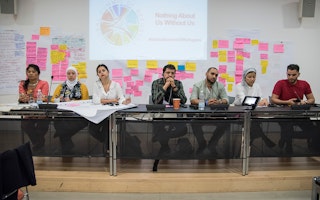Delinking Immigration and National Security
By Dimple Abichandani
In the aftermath of 9/11, the Bush administration merged the nation’s immigration and national security functions into a newly established Department of Homeland Security (DHS). In 2002, the National Security Entry-Exit Registration System (NSEERS) was launched to increase national security by requiring men ages 16 and older from 25 countries (24 of which were predominately Muslim) to register at ports of entry and immigration offices for fingerprinting, photographs, and lengthy interrogations. By 2003, over 80,000 men had gone through the “special registration” program, which resulted in more than 13,000 deportations and exactly zero terror prosecutions.
The NSEERS program illustrates the misguided and ineffective ways in which our immigration system has been used as a counterterrorism tool—with little impact in terms of increasing our safety and significant damage to community security and trust.
Following the tragic bombings in Boston, as facts surrounding the terror suspects began to emerge, those who were already opposed to immigration reform rushed to exploit the opportunity to make the case again that immigrants are a threat and that reform should be paused.
This time though, Americans know better, with 70 percent of Americans stating that the Boston bombing is not a factor in their personal view about immigration, and 66 percent agreeing that a pathway to citizenship would not increase the likelihood of terrorism. Fortunately, the public and reform advocates have not been deterred and the push to fix our broken system and ensure respect for the civil rights of immigrants is moving ahead.
Still, as the legislation progresses, there are policymakers who are seeking to expand the counterterrorism role played by immigration authorities, expansions that will likely lead to further civil liberties and rights abuses. For example, an amendment offered by Senator Lindsay Graham provides for heightened screening for people from nations that are deemed a national security threat by the secretary of the Department of Homeland Security. A racial profiling ban fails to prohibit profiling based on national origin or religion, and another provision allows for a “national security” exception to profiling by law enforcement. These policies will result in further racial and religious profiling and targeting of Muslim, Arab, and South Asian immigrant communities, and there is little or no evidence that the policies will increase national security.
The current debate on immigration reform is a moment for us to delink the issues of national security and immigration. Instead of prejudging immigrants as a potential threat to national security, we should recognize them for who they are–our neighbors, our coworkers, and classmates—people whose contributions are critical to this country’s thriving. This is the time to pass immigration reform that respects the rights of all communities and individuals and is a reflection of the best of American values, rather than a politicized expression of fear.
Dimple Abichandani is a program officer at Security & Rights Collaborative.


